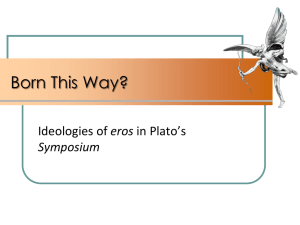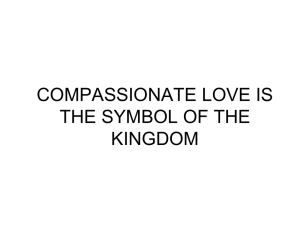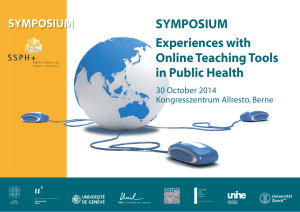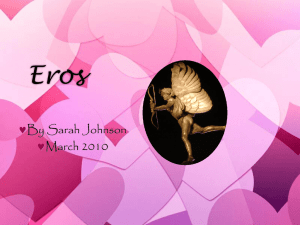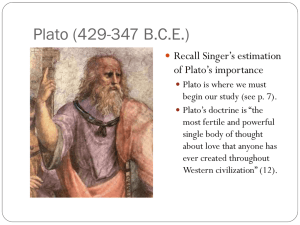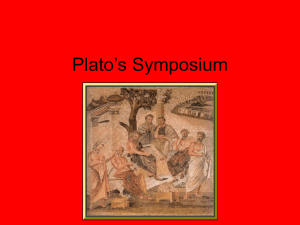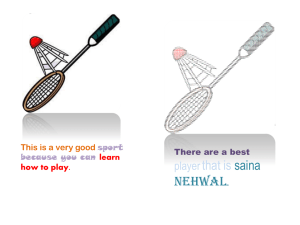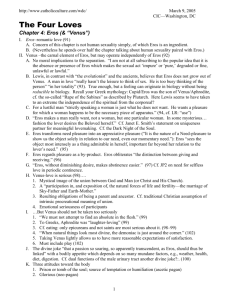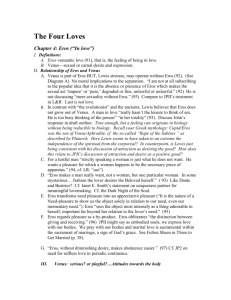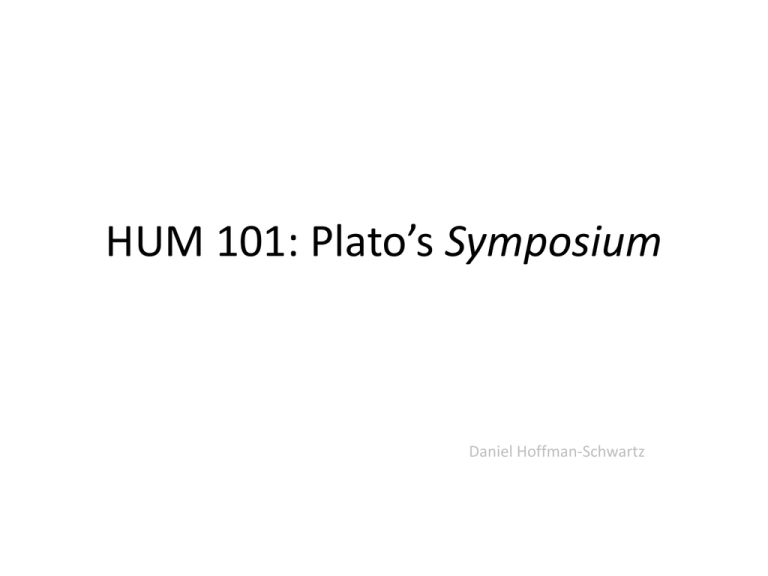
HUM 101: Plato’s Symposium
Daniel Hoffman-Schwartz
•What is a Symposium?
• “Symposium”; from the Greek symposion;
sym-posion means ‘drinking together.’ (‘Sym-’;
compare ‘symphony’ or ‘sympathy’; pinein, ‘to
drink.’)
• More colloquially: A symposium is a ‘drinking
party.’
The Institution of the Symposium in
Ancient Greece
• An exclusively male group of aristocrats,
served by male and female slaves.
• Participants sit on couches arranged in a
square formation, in a special room called an
andrôn.
• The andrôn is windowless; in a special part of
the home designated as ‘male’; has wall
paintings depicting symposia.
• After a meal and ritual cleansing, a drinking
ritual begins, led by the symposiarch.
• Guests each give a speech or sing a song,
following a strict order based on the seating
arrangement, usually moving to left to right.
The Symposium in the Symposium.
• Symposium begins with request to recount
legendary symposium of many years before.
• Apollodorus is asked to recount story of this
symposium; he wasn’t there; but he heard
story from Aristodemus, who was there.
• The Symposium is a rumor about the master
(Socrates), circulating between the students,
all of whom are also ‘in love’ with the master.
• Slaves (“flute girls”) are sent away.
• Instead of ritualized drinking, each person
drinks only as much he would like.
• A series of speeches debating nature of love
[Eros].
• Speakers: Phaedrus, Pausanias, Eryximachus,
Aristophanes, Agathon, Socrates (Diotima),
and Alcibiades.
• Framework of debate on Love [Eros] is mythic.
• This means: to discuss concept of love, one
must also discuss Love as a god (i.e., Eros).
1st key concept of love in the
Symposium: Pederasty
• Homosexual relation between older man and
a younger man.
• Older man educates younger man.
• Older man is wise, the younger man is
beautiful and innocent.
• Older man is active (the lover), younger man is
passive (beloved).
• Cyclical in character; the beloved learns how
to be a lover.
Pederasty continued…
• As Pausanias argues, there is a doublestandard attached to pederasty: men are
encouraged to pursue boys, but boys are
warned to stay away from men.
• Boys must test their pursuers to make sure
that they will hold up their end of the bargain,
to make sure that the erotic relation is also an
educational one.
• Distinction between ‘good’ pederasty, which is
educational and therefore ‘divine,’ and ‘bad’
pederasty,’ which is merely physical and
therefore ‘common.’
• Women could only be objects of common
love, precisely because they are not seen as
worthy of divine, educational love. (Adult
women are not citizens, cannot vote.)
• Homosexual relations between adult men
(i.e., citizens) are suspect; sexual relationships
between equals are problematic. Accusations
of prostitution, of trading sex for vote.
Aristophanes’ Theory: Love as Pursuit
of Lost Wholeness
• Myth: original humans who are too powerful.
• Each has 4 arms and legs, a rounded back, 2
heads and 2 faces.
• There are three genders: male, female, and
androgynous (male-female).
• The original humans are too powerful and
present a threat to the gods, so Zeus splits
them in half.
•The divided men become male homosexuals;
the divided women become female
homosexuals; the divided androgynes become
heterosexuals.
•Love is desire to be reunited with missing ‘other
half.’
•Model of love that is eternal, rather than
cyclical.
• Love is desire to be reunited with missing
‘other half.’
• Model of love that is eternal, rather than
cyclical.
• Aristophanes refers to the Hephaestus myth
that is also referred to in Book 8 of the
Odyssey: the lovers actually want to be bound
together in eternity (like Ares and Aphrodite in
the Odyssey).
Socrates’ Speech/Diotima’s Speech
• Instead of giving his own speech, Socrates
repeats a speech he had once heard, by
Diotima of Mantinea.
• So: Apollodorus was told of Socrates’ speech
by Aristodemus, which means that this is the
fourth mediation of Diotima’s speech:
• Diotima>>Socrates>>Aristodemus>>Apollodorus
• Why so much mediation?
The Question of Diotima
• Why does Socrates need to give his speech
through another figure? And one who is a
woman?
• Figure of Diotima repeats and complicates
exclusion of woman from institution of
symposium.
• Diotima is a priestess, a figure of myth and a
mythic figure. She is not only a woman, but a
stranger or foreigner. She brings knowledge from
outside the community.
Reviewing the Republic
• World of forms or ideas is real; the physical,
sensible world is a mere copy; art is a copy of
a copy, two degrees removed from the truth.
• The human soul is divided between a rational
part oriented towards ideas and a sensible
part oriented towards feelings.
• The poet appeals to the senses and pulls ‘us’
away from ideas; the philosopher appeals to
the intellect and pulls ‘us’ towards ideas.
The Twist
• But: Socrates uses myth and poetry too; the
philosopher needs the sensible too.
• This could be a simple contradiction: Socrates
contradicts himself…
• Or it could be a paradox: going beyond the
sensible by way of the sensible.
• Diotima’s speech returns explicitly to the
question of the relation between the ideal and
the sensible.
• Surprisingly, Love [Eros] is revealed to be
central to solving the problem of this relation.
• And Diotima’s speech returns implicitly to the
problem of the relation between poetry/myth
and philosophy.
Two Questions:
• Is Love [Eros] a god?
• Is Love beautiful?
• “You see, I had told her [Diotima] almost the
same things Agathon told me just now: that
Love is a great god and that he belongs to
beautiful things.” (202A)
Desire and Lack
• “What about Love? You agreed he needs good
and beautiful things, and that’s why he desires
them—because he needs them.” (202d)
• Love is not beautiful but instead desires
beautiful things.
• Desire is lack; we lack what we desire.
• Thus all of the detours and retellings of the
speech: the symposium, like Socrates himself,
is an object of desire….
• Therefore: Love [Eros] is not a God.
• “Then how could he be a god if he has no
share in good and beautiful things?”
• “There’s no way he could, apparently.”
• “Now do you see? You don’t believe Love is a
god either?”
• “Then, what could Love be? A mortal?” (202E)
Between-ness: Mediation
• Love is “in between mortal and immortal.”
(202d)
• Love is therefore a “spirit” [daimon], a
messenger between gods and men, who
“binds fast the all to all.”
• Men to gods: prayers and sacrifices; gods to
men: commands and gifts.
• Love is a mediator.
Translating between the Symposium
and the Republic
• In the mythic language of the Symposium:
Love [Eros] mediates between the
transcendent world of the gods and the
earthly, immanent world of humans.
• Or, in the more philosophical language of the
Republic: Love mediates between the world of
forms and the world of the senses.
• “Gods do not mix with men” (203a): an
argument against myth from within the
language of myth.
• Prepares the way for philosophy and for
transcendence – ultimately, for a
philosophical account of transcendence.
The (Mythic) Genealogy of Eros
• Poros (“way” or “resource”) is the father of
Eros; Penia (“poverty”) is the mother of Eros.
• The mother of Poros is Mêtis (“cunning”);
Mêtis is therefore the grandmother of Eros.
The Rivalry Between Myth and
Philosophy is a Family Rivalry
• Eros is philosophical (philosophy= ‘love of
wisdom’), but it is descended from Mêtis, the
ultimate epic or mythic value. (Odysseus is
“polymêtis,” ‘full of cunning.’)
• Love is only ever temporarily satisfied, always
loses what he has, always desires again.
• This is what ties Love as Eros to the love in
philosophy. Philosophy is ‘philo-sophia,’ ‘love
of wisdom.’
• Philo-sophia is ‘between wisdom and
ignorance’:
• the gods have no need of philosophy because
they are already wise;
• but those who are simply ignorant and don’t
that they don’t know also have no need of
philosophy.
• Philosophy has no need of the gods.
• Philosophy is tied to human lack or finitude.
• But there is no guarantee that humans will
begin thinking; it is possible to remain
ignorant; it is possible not to have
philosophical desire.
The Socratic Attitude vs. The Platonic
Attitude
• We might think of this idea of philosophy
(‘love of wisdom’) as ‘between wisdom and
ignorance’ as the ‘Socratic attitude.’
• Thus Socrates’ famous saying: “I know that I
don’t know.”
• We might contrast this to the ‘Platonic
attitude,’ which offers a rigid set of answers –
as in, for instance, the theory of forms.
Another Twist
• The twist is that Plato and Socrates
cannot actually be separated from one
another and there are both ‘Platonic’ and
‘Socratic’ moments in each of the
dialogues.
Love and Immortality
• The purpose of love is “giving birth in beauty”
(206c).
• “All of us are pregnant, Socrates, both in body
and soul.” (206c)
• Three forms of human immortality: biological
reproduction; epic heroism/fame; grasping
the Truth or the Idea (philosophy).
The Ladder of Forms
• “The final and highest mystery” (210a).
• A story of progressive abstraction.
• First step: Love of one beautiful
body>>begetting of beautiful ideas there.
(210b)
• Second step: Lover of all beautiful bodies;
concept of physical beauty emerges.
The Ladder of Forms
• Third step: once one realizes that physical
beauty is a concept, it becomes possible to see
that “the beauty of people’s souls is more
valuable than the beauty of their bodies.”
(210c)
• Fourth step: once there is an awareness of the
soul, then one can see the beauty in that
which shapes and cares for souls – laws and
customs. (210d)
The Ladder of Forms
• Fifth step: from practical education of souls to
abstract ideas and theories, love of wisdom
(i.e., philosophy).
• Sixth step: “the beautiful itself,” the pure idea,
pure being. (211B)
“The Beautiful itself”
• “…it always is and neither comes to be nor
passes away, neither waxes nor wanes.”
• “Nor will the beautiful appear to him in the
guise of a face or hands or anything else that
belongs to the body.”
• “It is not anywhere in another thing…but itself
by itself with itself.”
“The Beautiful itself”
• In other words: pure transcendence.
• How can we see that which is purely
transcendent and therefore beyond all
relation (“itself by itself with itself”)?
• Mystical experience? Vision without object?

